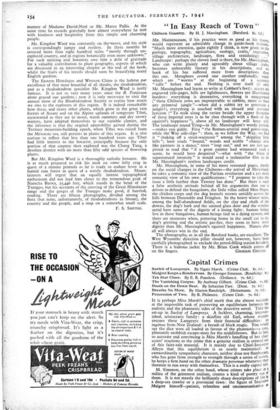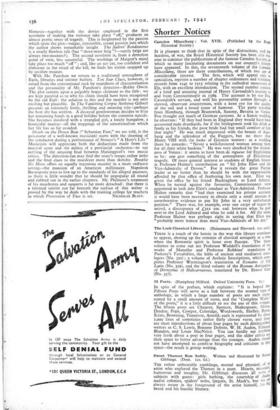Capital Crimes
IT is perhaps Miss Marsh's chief merit that she almost succeeds at the impossible task of preserving an equilibrium between the realistic and the phantastic sides of the detective novel. Take the set-up in Surfeit of Lampreys. A feckless, charming, impover- ished, aristocratic family : a skinflint old Earl, whose murder rescues these Lampreys from their financial difficulties : an ingenue from New Zealand: a breath of black magic. You would say the dice were all loaded in favour of the phantastic—a cosy, pleasantly snobbish escape-story for the middlebrows. But in fact, so accurate and convincing is Miss Marsh's handling of her char- acters' reactions to the crime that a genuine realism is created out of this fairy-tale material. It is mainly due to Chief-Inspector Alleyn that this equilibrium is so nearly maintained: an extraordinarily sympathetic character, neither dour nor flamboyant, who has gone from strength to strength through a series of novels, he keeps a firm hand on the other dramatis personae whenever the)' threaten to run away with themselves. This is a really capital tale.
M. Sitnenon, on the other hand, whose crimes take place in a milieu of the grimmest realism, creates a kind of poetry out of them. It is not merely the brilliantly sharp descriptions of life t° a deep-sea trawler or a provincial town : the figure of Inspector Maigret himself—patient, relentless and uncommunicative as
Nemesis—together with the device employed in the first novelette of making the violence take place " off," produces an almost poetic sense of tragedy. This is heightened by the passion which spins the plot—vulgar, irresistible, sexual passion into which the author shows remarkable insight. The Sailors' Rendezvous is a nearly flawless tale (but " three-mast brig "?—surely brigs are always two-masters?). The second novelette is, from a detection point of view, less successful. The workings of Maigret's mind take place too much " off " ; and, like an ace cat, too confident and elaborate in the ritual of the kill, he finds his victim snapped up by another mouser. With Mr. Punshon we return to a traditional atmosphere of Earls, libraries and sinister butlers. Ten Star Clues, however, is raised from the conventional ruck by soundness of characterisation and the personality of Mr. Punshon's detective—Bobby Owen. The plot centres upon a palpably bogus claimant to the title : we are kept puzzled as to why his claim should have been recognised by the old Earl : the solution to this and the murder is not only exciting but plausible. In The Vanishing Corpse Anthony Gilbert presents an extremely lively, thrilling and amusing tale—perhaps the best she has written. A decayed gentlewoman decides to blue her remaining funds in a good holiday before she commits suicide. She becomes involved with a strangled girl, a lonely bungalow, a homicidal maniac—all the trappings of the sensationalism which her life has so far avoided.
Death on the Down Beat (" Sebastian Farr," we are told, is the pen-name of a well-known musician) starts with the shooting of the conductor during a performance of Strauss's " A Hero's Life." Musicians will appreciate both the deductions made from the musical score and the milieu of a provincial orchestra—to say nothing of the amusing feud between Maningpool's two music critics. The detection-fan may find the story's tempo rather jerky and the final clues to the murderer more than sketchy. Breathe No More offers an equally ingenious murder in a more ordinary setting—the mansion of an American millionaire. Napoleon Buonaparte tries to live up to the standards of his alleged ancestor, so there is little wonder that he should be unpopular all round and rubbed out in the earlier chapters. Mr. Philmore's treatment of his murderees and suspects is far more detached : that there is a talented satirist not far beneath the surface of this writer is proved by the way he deals with the training college fir teachers
in which Procession of Two is set. NICHOLAS BLAKE.































 Previous page
Previous page